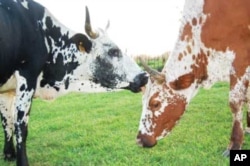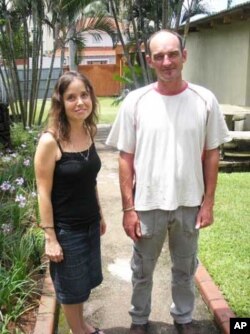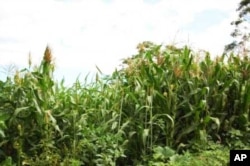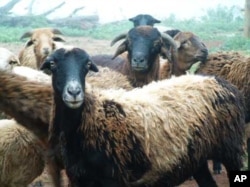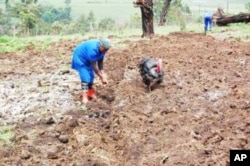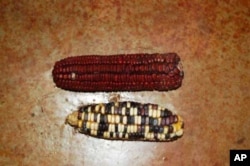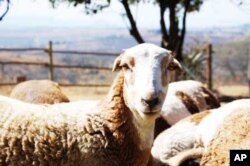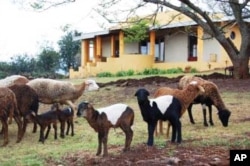This is Part 5 of a 5-part series: Innovations in African Farming
Continue to Part: 1 / 2 / 3 /4 /5
Almost four years ago, Richard Haigh had what he called a “crazy idea.” At the time, he was working for a South African health NGO. Although he was based in the city of Durban, his duties often took him deep into the rural interior of KwaZulu-Natal province.
“For years I had noticed people there using land in very traditional ways – planting traditional crops, having traditional animals,” Haigh said. “I felt quite inspired by that. And when I turned 40 [in 2007], I thought ‘I’m just so tired of the politics of the NGO world; why not purchase a piece of land and buy a small farm and see what we can do?’”
So Haigh quit his job and bought some land in the isolated KwaZulu-Natal midlands. He named his farm “Enaleni” – a Zulu term that implies “agricultural abundance; a place where there is more than enough.”
Haigh acknowledged that this particular name was “insanely optimistic” at the time, given that there was “next to nothing” on his newly-acquired land.
“We started from scratch here – no fencing, a dysfunctional borehole, no water, no pasture…” he told VOA. Haigh’s property was also particularly dry. It’s situated in what he terms a “rain shadow,” which means surrounding mountains block weather systems that produce rain.
Yet the area also suffers extremely high humidity. Haigh wanted to farm with cattle and sheep, but he was advised that these conditions – “dry but humid” - would be very harsh on animals. “Every disease that cattle and sheep get, you find here,” he said.
But, despite the odds against him, Haigh has transformed his land into “one of the best examples of an agro-ecological farm in Africa,” says Danielle Nierenberg, a senior researcher at the Washington, DC-based Worldwatch Institute, an organization that promotes food production that doesn’t harm the environment.
Farming to protect the surroundings
“Agro-ecology is a type of agricultural system and land use system that is also designed to protect the ecology,” said Haigh.
Serena Milano, of Slow Food International, a Rome-based group promoting the sustainable production of local food varieties, explained, “Food production must also protect ecosystems and soil fertility; it must preserve wild resources, including forests; and it must protect the ocean, rivers, lakes, and groundwater supplies…. When the trees are lost, so too are many wild foods and medicinal herbs essential to communities’ diet and health.”
Instead of growing one particular crop or farming with one specific breed of animal, Haigh manages several different crops and animals on his land. He farms with local sheep and cattle and local maize and vegetables.
“On an agro-ecological farm such as mine, you’re not forced to mono-crop [growing one particular crop for a mass market]. You grow a variety of smaller, ultimately better quality crops. If more farmers do this, consumers will have access to a greater variety of foods. People will start cooking better, healthier foods,” Haigh said.
The farmer doesn’t use any chemical fertilizers or pesticides. Instead, he practices “push-pull agriculture,” which uses “alternating intercropping” of plants that repel pests – pushing them away from the harvest, and ones that attract pests – pulling them away from the harvest. He uses animal manure and compost to nourish his crops.
“So there’s no harmful runoff from my land into rivers,” Haigh said.
Zulu sheep and cattle
Instead of farming with “high maintenance” foreign breeds of stock animals, he breeds only traditional, indigenous animals – Nguni cattle and Zulu sheep.
“Sheep which have specially adapted to this specific area, with a high humidity and a high temperature, and heavy tick infestation with external and internal parasites,” Haigh explained.
Because they’ve evolved locally, over the past 2,000 years, the sheep and cattle have developed high resistance to local pests and diseases. “This means we don’t have to pump the animals full of antibiotics, like we would have to do with exotic breeds. So our meat is totally, totally healthy for people to eat,” said Haigh.
But, despite this, he said over the years South African agricultural authorities have promoted foreign animal breeds ahead of local ones.
“Those were totally ignored by our department of agriculture [whose officials had an attitude of], ‘what are these funny sheep; they all look so different; their colors are different; their shape is different; some of them have small ears, fat tails, these long, thin legs.”
Haigh continued, “In the official mind, difference means inferiority.” And so, like many other parts of the world, South African officials, farmer associations and farmers themselves have preferred developing imported breeds that are “all very uniform” and planting “uniform” exotic crops, he said, and have ignored the “obvious” advantages of local animals and crop varieties.
Changing tastes
Haigh is doing his best to change this attitude. He’s trying to convince “as many farmers as possible” that there’s a market for local food. “This is absolutely essential because if local farmers don’t regard indigenous crops and animals as valuable, and if they listen to people who tell them they will only make money by farming with exotic breeds of animals and imported crops, then obviously the production of local food will suffer,” he said.
Then, Haigh maintained, products such as his free range eggs will never be available to consumers, despite their quality. “At the market where we sell our surplus eggs, people say, ‘Shu, but these eggs! Look at all the different colors!’ We say, ‘Well, we have different types of chickens, you know!’ There’s a market for that.”
Haigh’s convinced consumer tastes have changed. “They’re willing to try different, new things; many no longer want the same uniform kind of food,” he insisted. “There is a real place for small scale producers, working on an agro-ecological system, to produce food and to complement an industrial [agricultural] system.”
Bigger is not best
Another perception Haigh’s combating is the one that says to be a successful farmer, one has to run a massive commercial, technical operation producing tons of food. For too long now, he said, South Africa’s emerging black farmers especially have had an attitude that to be successful, they must manage big farms.
“I try to tell them that they can still have relatively small farms and be profitable. Of course, many still think that to be successful they must have the biggest farms and make heaps of money, because they’ve been seduced by South Africa’s extremely high-tech, streamlined and very corporate farming system,” Haigh explained.
He described it as a “myth” that the only way to end hunger was through increasing numbers of “factory” farms. “The way to easing hunger seems to me to be to develop more small scale food producers, because these are the people who are better able to serve local, hungry populations because they live directly among these populations,” Haigh said.
He therefore maintained that small agro-ecological farms like his, that are producing smaller yields but higher quality food, also have a valuable contribution to make in feeding the globe’s population.
‘Never superrich’
Haigh acknowledges he’s a “dreamer,” hoping for a time in the future when farmers farm because of a love for their vocation, and respect for their land, crops and animals…not “solely” because of a love of money.
“There’s a Sotho poet who once said, ‘Let what you do be what you love,’” he said, laughing. “We have no illusions that we are going to have a three-week holiday every year and travel overseas and whatever. We live a simple but a very, very rich life…We are just ‘being’ in a way, but we are doing what we love.”
Haigh knows he’ll never be a “superrich” farmer, but he’s at peace knowing that he’s doing what he can to supply a “small corner” of the world with healthy food, and to preserve some of South Africa’s indigenous animals and crops.




